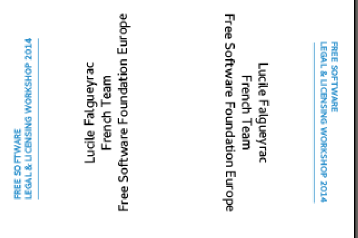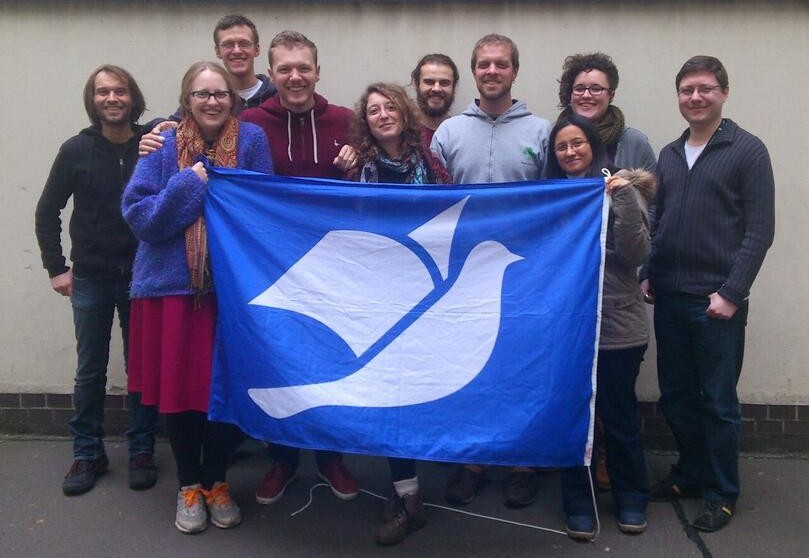In the last months of my internship at FSFE, I started following debates around TTIP (the Transatlantic Trade and Investment Partnership). TTIP is a huge “deep and comprehensive” free trade agreement between the US and the European Union, which started to be negotiated in July 2013. Well prepared by the great ACTA scandal of 2012 and by the November 2013 leak of the Trans Pacific Partnership (TPP)’s Intellectual Property chapter (thanks Wikileaks), we immediately looked for the impact of TTIP on software patents, copyright enforcement and DRM (digital rights management) circumvention. After a few months working full time on the topic, I now believe that the problem is much deeper that any of these specific issues.
Policy Laundering: democracy isn’t competitive
This week Tyler Snell wrote an outstanding article about the “deep and comprehensive” trade agreements. He develops the useful concept of policy laundering. Here is what he says:
A growing pernicious trend that is greatly affecting digital policy around the world is called “policy laundering” – the use of secretive international trade agreements to pressure countries to commit to restrictive or overly broad laws that would not ordinarily pass a transparent, democratic process.
Not only is the behind-closed-doors procedure questionable, many of the representatives negotiating such agreements are not elected representatives but rather trade appointees and powerful multinational corporate lobbyists. Policy laundering deprives each jurisdiction, and most important their citizens, the chance to engage in a legitimate legislative debate.
Provisions which failed to pass democratic elected parliaments, brought back to life through international treaties, it sounds much too familiar. A few reasons why the trick does work:
- The agreements are negotiated for years, in secret.
1) Access to a limited number of negotiating documents is only granted to the few MPs member of trade committees (INTA in the case of the European Parliament). This access is made via “secure reading rooms”. They can take no notes, bring no devices. They cannot come with staff members specialized in Trade Policy. Seeing the complexity of trade deals’ texts (often over 1000 pages of legalese) and the fact that the devil is always in the details, they are highlight unlikely to manage anything useful with this kind of “access”.
2) Even if they do spot something harmful in the negotiating text, no elected representative sits at the negotiating table. They have very little leverage to influence the negotiating process whatsoever.
3) Secrecy around the negotiations make campaigns very difficult. Activists are often forced to fight without knowing what they fight, until it is too late (building a campaign takes time). They are either restraining themselves in order to not say anything untrue, or basing their work on guesses. It is then easy for the deal’s promoters to dismiss the critics as “lies” or “misleading“. Reversing the burden of the proof this way is highly undemocratic in itself.
Fortunately, there are still great people working in the institutions. Documents are leaked surprisingly often, enabling us to criticize secrecy AND to know what we are talking about when discussing the content. Thank you sources.
- The ratification process is hardly democratic
After years of negotiation, the deals finally arrive in front of parliaments for ratification. MPs are then supposed to say a simple “yes” or “no” to a thousand pages of text, likely to include good and terrible things. In case of bad wording, loopholes, blurry definitions, harmful provisions, MPs cannot amend but have to reject the whole agreement. The pressure to ratify, after “so much effort put into the negotiating process”, is enormous and trade deals are therefore usually overwhelmingly ratified.
Fortunately, sometimes things do not go as planned, like in the ACTA case.
- The deals can be put in application before complete ratification
In Europe, trade and investment are EU competences. However, “deep and comprehensive agreements” deal with more, including sectors that are still competences of the Member States. After ratification by the European Parliament, such deals must therefore also be ratified by national parliaments. Because democratic processes take too long, they can enter into force provisionally, which means before ratification – the vote of elected representatives. The provisional entry into force exerts pressure on national parliaments to vote in favor of the agreement. When ratification might be difficult, or event rejected in a country or region (for federal states), the ratification is not put on the Parliaments agenda and the provisional implementation stays in force.
Worst, states who did not ratified a trade or investment agreement, but have it in force because of the provisional application can be attacked via dispute settlement mechanisms included in the deals.
Another great article recently analyzed the $50.02 billion (yes, yes) Yukos ISDS case (Investor-State Dispute Settlement) under the Energy Charter Treaty. Independently from the rest of the story, the author notes that:
[it] needs to be emphasized here that Russia only accepted the provisional application of the Energy Charter Treaty (pending ratification) in 1994 meaning that the country will only apply the Treaty “to the extent that such provisional application is not inconsistent with its constitution, law or regulations.” Same was the approach adopted by Belarus, Iceland, Norway and Australia.
Russia never ratified the ECT and announced its decision to not become a Contracting Party to it on August 20, 2009. As per the procedures laid down in the Treaty, Russia officially withdrew from the ECT with effect from October 19, 2009.
Nevertheless, Russia is bound by its commitments under the ECT till October 19, 2029 because of Article 45 (3) (b) which states that “In the event that a signatory terminates provisional application…any Investments made in its Area during such provisional application by Investors of other signatories shall nevertheless remain in effect with respect to those Investments for twenty years following the effective date of termination.”
I strongly encourage you to read the whole analysis. What it means is that a government can sign any treaty, with far reaching consequences for its population, economy, environment and ability to legislate, and the state can face the all the consequences of the agreement without ever having asked the parliaments’ approval.
Why does it all mean for free software
Free software is important, but it is only one of many crucial policy issues. Trade deals like TTIP or CETA can have an impact on free software – and I will describe concretely how in a next post -, like on everything else you care about, be it pesticides control, financial regulation or animal welfare.
More importantly, they modify policy making as a whole, making it less transparent, less democratic and harder to reform for the best.
However, ff enough pressure is put on members of the European Parliament, 2014 might see the second strong rejection of a dangerous secret deal, after ACTA. CETA ( Comprehensive Economic and Trade Agreement), the EU-Canada deep and comprehensive free trade agreement, was concluded last week. It will be initiated in September and its ratification process in the European Parliament will start this Autumn. A good moment to send a strong message to the European Commission and to our governments: policy laundering is not a legitimate way to legislate, and should never be.


